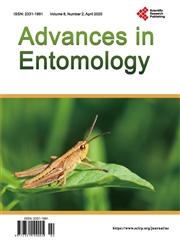Metabolic Changes during Acclimation and Hardening to Heat and Drought Stress in Zaprionus indianus
引用次数: 0
Abstract
The survival ability of insects can be limited with the changes in the levels of energy metabolites under stressful conditions but only a few studies have considered the plastic effects of heat and related climatic factors relevant to tropical habitats. The objectives of our study were to determine whether adults of Zaprionus indianus are capable of rapid heat hardening (RHH) and rapid desiccation hardening (RDH) and to compare its benefits with heat acclimation (HA) and desiccation acclimation (DA). Adult flies reared under season-specific simulated conditions were subjected to 38˚C for RHH and 32˚C for HA, while 5% relative humidity (RH) was maintained for RDH and 40% RH for DA. Stress-induced effects of heat and desiccation on the levels of five metabolites namely cuticular lipids (CL), total body lipids (TBL), protein, proline, and carbohydrates were then estimated by biochemical method. Different duration of heat hardening and acclimation led to more accumulation of CL whereas different durations of desiccation hardening and acclimation revealed less accumulation. In contrast, there was an accumulation of carbohydrates and protein under desiccation hardening and acclimation whereas there was the utilization of carbohydrates and protein under heat hardening and acclimation. However, mixed results were observed on the level of proline and TBL under both heat and desiccation stress. These stress-triggered changes in the levels of various metabolites suggest a possible link between heat and desiccation tolerance. Hence, these compensatory changes in the level of various metabolites also suggest possible energetic homeostasis in Z. indianus living under harsh climatic conditions of heat and drought in tropical regions.热干旱胁迫下印度栗螟驯化和硬化过程中的代谢变化
昆虫的生存能力可能受到应激条件下能量代谢物水平变化的限制,但只有少数研究考虑了与热带生境有关的热和相关气候因素的塑性效应。本研究的目的是确定印度扎皮蝇成虫是否具有快速热硬化(RHH)和快速干燥硬化(RDH)的能力,并将其与热驯化(HA)和干燥驯化(DA)的益处进行比较。在特定季节的模拟条件下,成虫被饲养在38˚C的RHH和32˚C的HA环境中,RDH和DA分别保持5%和40%的相对湿度。然后用生化方法测定了应激诱导的热和干燥对表皮脂质(CL)、总脂质(TBL)、蛋白质、脯氨酸和碳水化合物5种代谢物水平的影响。不同时间的热硬化和驯化导致CL积累较多,而不同时间的干燥硬化和驯化导致CL积累较少。而在干燥硬化和驯化条件下,碳水化合物和蛋白质积累较多,而在热硬化和驯化条件下,碳水化合物和蛋白质利用较多。然而,在高温和干燥胁迫下,脯氨酸和TBL水平的变化结果却不尽相同。这些应激引发的各种代谢物水平的变化表明,高温和干燥耐受性之间可能存在联系。因此,这些代谢物水平的代偿性变化也表明,在热带地区炎热和干旱的恶劣气候条件下,印度稻可能存在能量稳态。
本文章由计算机程序翻译,如有差异,请以英文原文为准。
求助全文
约1分钟内获得全文
求助全文

 求助内容:
求助内容: 应助结果提醒方式:
应助结果提醒方式:


